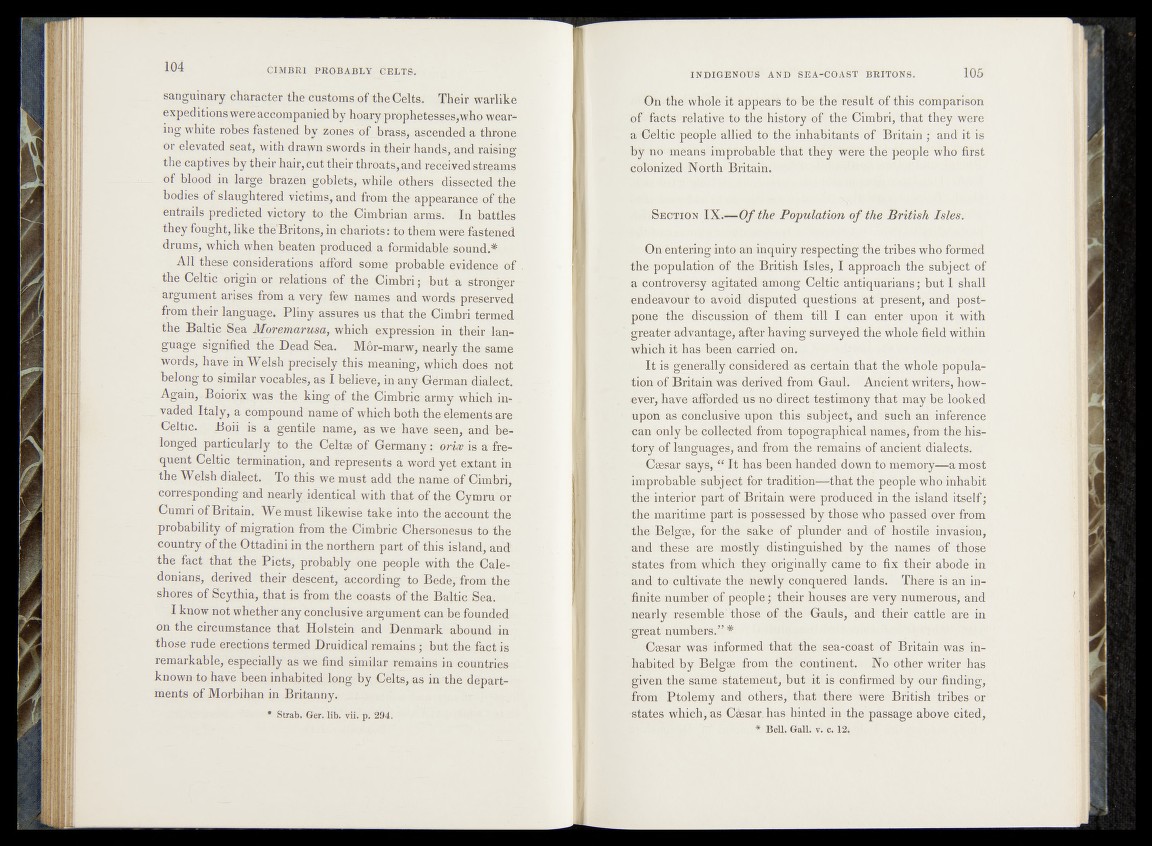
sanguinary character the customs of the Celts. Their warlike
expeditions were accompanied by hoary prophetesses,who wearing
white robes fastened by zones of brass, ascended a throne
or elevated seat, with drawn swords in their hands, and raising
the captives by their hair, cut their throats, and received streams
of blood in large brazen goblets, while others dissected the
bodies of slaughtered victims, and from the appearance of the
entrails predicted victory to the Cimbrian arms. In battles
they fought,like the Britons, in chariots: to them were fastened
drums, which when beaten produced a formidable sound.*
All these considerations afford some probable evidence of
the Celtic origin or relations of the Cimbri; but a stronger
argument arises from a very few names and words preserved
From their language. Pliny assures us that the Cimbri termed
the Baltic Sea Moremarusa, which expression in their lan-
guage signified the Dead Sea. M6r-marw, nearly, the same
words, have in Welsh precisely this meaning, which.does not
belong to similar vocables, as I believe, in any Ge'r'man dialect.
Again,-Boiorix was the king of the Cimbric army which invaded
Italy, a compound name of which both the elements are
Celtic. Boii is a gentile name, as we have seen, and belonged
particularly to the Celtse of Germany : oriw is a fre-
quept Celtic termination, and represents a word yet extant in
the Welsh dialect. To this we must add the name of Cimbri,
corresponding and nearly identical with th a t of the Cymru or
Cumri of Britain. We must likewise take into the account the
probability of migration from the Cimbric Chersonesus to the
country of the OttadinLin the northern part of this island; and
the fact that the Piets, probably one people with the Caledonians,
derived their descent, according to Bede, from the
shores of Scythia, that is from the coasts of the Baltic Sea.
I know not whether any conclusive argument can be founded
on the circumstance that Holstein and Denmark abound in
those rude erections termed Druidical remains ; but the fact is
remarkable, especially as we find similar remains in countries
known to have been inhabited long by Celts, as in the departments
of Morbihan in Britan ny. ...
* Strab. Ger. lib. viiv p. 294.
On the whd'le it appears to be the result of this comparison
of Tacts ‘relativeTo the history of the Cimbri, that they were
a Celtic people ailietTto the inhabitants of BritaiiT and it is
by no means improbable that they were the people who first
colonized North Britain.
<. S e c t io n IXt— O f the Population o f the British Isles.
On entering into an inquiry respecting the tribes who formed
the population, of the British IsldsfU app'rS'ach the subject of
&■' Controversy agitated among Celtic antiquarians; but I shall
endeavour to avoid. disputed questions at^present, and -postpone
the discussionvof them till I can enter upouift with
greater advantage,-after‘having surveyed thevwhole field within
which it has been .carried- on.
It is generally eddsidered-as certain that the whofepopi}la_
rion of Britain Was derived1 froin Gaul. Ancient Writ^|syMb%r
ilver, have afforded? us no direct, testimohy thaf may Bedobked
upon hs conclusive upon this' 's u b y e d ty * a n d ' such an inference
-can-Jonlybe collected ;from topographical Dames, froth th e history
of languages', and^frlba the remains ;of ancient' dialects^'1]
srasGeesar' say ski* If has' bephhanded down to m em w ^ a most
Imippebable subject for tradition—th a tth c r^ ^ ^ fe ’Whb inhAb^t
tjhe interior part of Britain Were produced in the island itsef%
th e maritime p art ^possessed by those who^p#s&ed over from
th e Belgse, for the sake* o f plunder and o f ’hostile invasion,
and these are most-1 yfedistinguished bytthe names of thbisfe
states from which they originally came to fix their1 abode in
and tbseuitivate the newly conquered^ lands, ^ffiere-is* an infinite
number of people f their houses are ^ r y numerous/“ and
nearly resemble'those of the Gauls, and their-cattle are in
'great numbers.” *
—-Caesar was informed th a t the sea,-coast of Britain was'inhabited
by Belgse from the continent.^* N e ith e r 'writer has
given the same statement, but it is confirmed by our’finding!!
from Ptolemy and others! that there were British tribes or
-states which, as Cfesar. has hinted in the passage above cited,
i Bell. Gal']» M M l